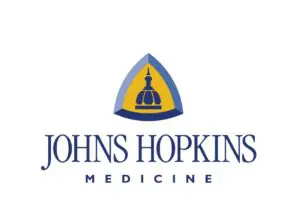Timeframe: 2023 – 2028
Goals: Assess the potential of an inhibitor of glutamine metabolism (DRP-104; sirpiglenastat) in combination with an immune checkpoint inhibitor (durvalumab) as a treatment option for unresectable disease
Principal Investigators: Marina Baretti, MD and Mark Yarchoan, MD

Study overview: This phase Ib/2 clinical study, led by Dr. Marina Baretti and Dr. Mark Yarchoan of Johns Hopkins University, will test a new cancer treatment that capitalizes on FLC’s unique metabolism. Recent work from several research teams indicates that the DNAJB1-PRKACA fusion causes a metabolic rewiring of FLC tumor cells that makes them dependent on breaking down large amounts of the amino acid glutamine. This “glutamine addiction” leads to a nutrient-depleted tumor environment that is also enriched in immunosuppressive metabolites including ammonia. This could impair a patient’s ability to launch an effective immune response to the cancer.
The study plans to test the effectiveness of treating FLC patients with an inhibitor of glutamine metabolism (DRP-104; sirpiglenastat) in combination with an immune checkpoint inhibitor (durvalumab). The team’s hypothesis is that this treatment could deliver a “one-two punch” against FLC by:
- Directly attacking an important metabolic pathway of FLC tumors
- Restoring an immune supportive tumor environment, and therefore enabling a patient’s immune cells to attack the cancer.

The glutamine antagonist drug DRP-104 is being developed by Dracen Pharmaceuticals. Initial testing of DRP-104 in patients with solid tumors has already been completed. Dracen will provide DRP-104 for this FLC trial, as well as the necessary regulatory and operational support for the effort.
The phase 1b/2 clinical trial at Johns Hopkins will enroll patients diagnosed with unresectable or metastatic FLC whose disease progressed on prior immune therapy. The study will have two key aims:
- Testing the safety and clinical activity of the DRP-104/durvalumab drug combination in children and adults with advanced FLC.
- Determining whether the treatment suppresses glutamine-dependent processes and increases the number of activated FLC-specific T cells around FLC tumors.
Patient enrollment is anticipated to begin in late 4Q 2023. More information will be released once the trial receives all the necessary institutional and regulatory approvals.
